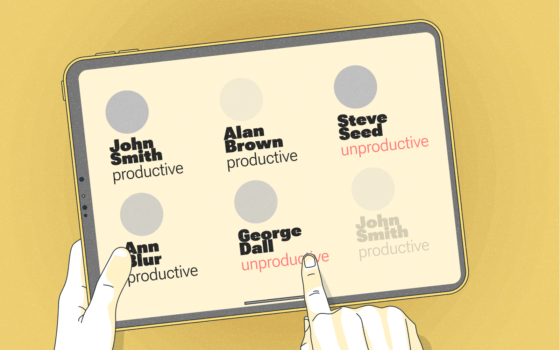What Is Deep Work?
Deep Work Summary: • Concept introduced by Cal Newport in 2016 • Refers to focused, distraction-free work on cognitively demanding tasks • Typically produces high-value results and improves skill • Contrasts with "shallow work" (routine, less cognitively demanding tasks) • Key benefits: increased productivity, better work quality, and enhanced job satisfaction • Challenges: requires discipline, may be difficult in open office environments
In today's fast-paced, hyper-connected work environment, the ability to focus deeply on cognitively demanding tasks has become increasingly rare—and increasingly valuable. Enter the concept of "deep work," a term coined and popularized by Cal Newport, a computer science professor at Georgetown University, in his 2016 book "Deep Work: Rules for Focused Success in a Distracted World."
Definition and Concept
Deep work refers to the ability to focus without distraction on a cognitively demanding task. It's a skill that allows you to quickly master complicated information and produce better results in less time. Newport argues that deep work is becoming increasingly rare at exactly the same time it is becoming increasingly valuable in our economy. As a result, the few who cultivate this skill, and make it the core of their working life, will thrive.
"Deep work is the superpower of the 21st century." – Cal Newport
The concept of deep work isn't entirely new. It builds on ideas from psychology, neuroscience, and philosophy about focus, flow states, and deliberate practice. However, Newport's framing of deep work as a distinct and valuable skill has resonated with many professionals seeking to improve their productivity and satisfaction in an increasingly distracted world.
Characteristics of Deep Work
Deep work is characterized by several key features:
- Focused attention: Deep work requires your full, undivided attention on the task at hand.
- Cognitively demanding: The tasks involved in deep work are typically complex and require significant mental effort.
- Distraction-free: To engage in deep work, you need to eliminate or minimize interruptions and distractions.
- Time-intensive: Deep work often requires extended periods of concentration, typically 60-90 minutes or more.
- Value-producing: The output of deep work tends to be high-value, creating new insights, solving complex problems, or producing high-quality creative work.
Deep Work vs. Shallow Work
To better understand deep work, it's helpful to contrast it with its opposite: shallow work. Newport defines shallow work as "non-cognitively demanding, logistical-style tasks, often performed while distracted." These tasks tend to be easier to replicate and typically don't create much new value in the world.
| Deep Work | Shallow Work |
| Requires intense focus | Can be done with distractions |
| Cognitively demanding | Logistical, less mentally taxing |
| Creates significant value | Creates less unique value |
| Improves skills | Maintains current skill level |
| Often requires longer time blocks | Can be done in short bursts |
| Examples: Writing a research paper, strategic planning, learning a new programming language | Examples: Checking emails, scheduling meetings, filling out paperwork |
The Benefits of Deep Work
Engaging in deep work can lead to numerous benefits, both personal and professional:
- Increased productivity: By focusing intensely on important tasks, you can accomplish more in less time.
- Higher quality output: Deep work often results in better, more thoughtful work products.
- Skill development: Consistent deep work can help you rapidly improve your skills and knowledge.
- Greater job satisfaction: Accomplishing challenging tasks can lead to a sense of fulfillment and purpose.
- Competitive advantage: In a world where many workers are constantly distracted, the ability to do deep work can set you apart.
A 2023 study by the Harvard Business Review found that employees who regularly engaged in deep work reported 37% higher job satisfaction and were 22% more likely to receive promotions compared to their peers who primarily engaged in shallow work.
Did you know? According to a 2024 Gallup workplace survey, only 22% of knowledge workers report being able to engage in deep work for more than 2 hours per day. This scarcity makes deep work an increasingly valuable skill in the modern workplace.
Challenges to Deep Work
Despite its benefits, deep work faces several challenges in the modern workplace:
- Open office layouts: Many workplaces prioritize collaboration over focus, making it difficult to find quiet spaces for deep work.
- Digital distractions: The constant ping of emails, messages, and notifications can interrupt focus.
- Culture of connectivity: Many workplaces expect immediate responses to communications, making it hard to disconnect.
- Misaligned incentives: Some workplaces reward visible busyness over deep, focused work.
- Lack of training: Many workers haven't been taught how to engage in deep work effectively.
A 2024 study by the University of California, Irvine, found that it takes an average of 23 minutes and 15 seconds to fully recover focus after an interruption. This highlights the significant cost of distractions in the workplace.
Strategies for Cultivating Deep Work
While deep work can be challenging, there are several strategies that can help cultivate this valuable skill:
1. Schedule Deep Work
Deliberately block out time in your calendar for deep work. Treat these blocks as important appointments that shouldn't be moved or canceled lightly.
2. Create a Ritual
Develop a routine that signals to your brain it's time for deep work. This might include going to a specific location, using noise-canceling headphones, or starting with a particular warm-up task.
3. Eliminate Distractions
During deep work sessions, turn off notifications, close unnecessary browser tabs, and consider using apps that block distracting websites.
4. Practice Mindfulness
Mindfulness meditation can improve your ability to focus and resist distractions. Even short daily sessions can yield benefits over time.
5. Take Breaks
Use techniques like the Pomodoro Method (25 minutes of focused work followed by a 5-minute break) to maintain energy and focus over longer periods.
Pro Tip: Try the "4DX" approach to deep work: 1. Focus on the Wildly Important 2. Act on Lead Measures 3. Keep a Compelling Scoreboard 4. Create a Cadence of Accountability This framework, adapted from the book "The 4 Disciplines of Execution," can help you consistently engage in deep work and track your progress.
Deep Work in Different Professions
While the concept of deep work is universally applicable, its implementation can vary across different professions. Here's how deep work might look in various fields:
| Profession | Deep Work Examples |
| Software Developer | Coding complex algorithms, architecting system designs |
| Writer | Drafting chapters, outlining complex narratives |
| Scientist | Analyzing data, designing experiments, writing research papers |
| Designer | Creating detailed mockups, solving complex UX problems |
| Manager | Strategic planning, analyzing performance data, crafting policies |
| Lawyer | Researching case law, drafting legal documents |
The Economic Value of Deep Work
In an era of automation and artificial intelligence, the ability to perform deep work is becoming increasingly valuable. Tasks that can be easily replicated or automated are at risk of being taken over by machines, while cognitively demanding tasks that require creativity, problem-solving, and high-level thinking are likely to remain in human hands.
A 2023 report by the World Economic Forum estimated that by 2025, 85 million jobs may be displaced by a shift in the division of labor between humans and machines, while 97 million new roles may emerge that are more adapted to the new division of labor between humans, machines and algorithms. Many of these new roles are likely to require the kind of cognitive skills that deep work cultivates.
In terms of individual earning potential, a 2024 survey by PayScale found that professionals who reported regularly engaging in deep work earned on average 17% more than their peers in similar roles who didn't practice deep work. The survey covered various industries and job levels, suggesting that the benefits of deep work are widely applicable.
Key Statistic: According to a 2024 McKinsey Global Institute report, professionals who can effectively perform deep work could see their earning potential increase by 40-50% over the next decade, compared to those who primarily engage in routine, easily automatable tasks.
Deep Work and Work-Life Balance
While deep work can significantly boost productivity and job satisfaction, it's important to balance it with other aspects of life. Here are some considerations:
- Set boundaries: While deep work requires intense focus, it's crucial to set clear boundaries between work and personal life to avoid burnout.
- Quality over quantity: The goal of deep work isn't to work more hours, but to make the hours you do work more productive.
- Recovery time: Engaging in deep work can be mentally taxing. Ensure you have adequate time for rest and recovery.
- Flexibility: While scheduling deep work is important, remain flexible enough to handle unexpected priorities or emergencies.
A 2024 study published in the Journal of Applied Psychology found that employees who engaged in regular deep work reported better work-life balance and lower stress levels, despite often working on more challenging tasks. The researchers attributed this to increased job satisfaction and a greater sense of accomplishment.
Measuring Deep Work
Quantifying deep work can be challenging, as it's often more about quality than quantity. However, here are some potential metrics:
- Time spent in deep work: Track the number of hours spent in focused, distraction-free work.
- Deep-to-shallow ratio: Compare the time spent on deep work versus shallow tasks.
- Output quality: Assess the quality of work produced during deep work sessions.
- Learning rate: Measure how quickly you're acquiring new skills or knowledge.
- Flow state frequency: Track how often you achieve a state of flow during work.
Some organizations are beginning to recognize the value of deep work and are implementing ways to measure and encourage it. For example, Boston Consulting Group has implemented a predictable time off (PTO) policy, where consultants are required to take planned nights or days off, allowing for better scheduling of deep work sessions. They reported a 35% increase in team effectiveness after implementing this policy.
The Future of Deep Work
As we look to the future, the importance of deep work is likely to grow. Here are some trends and predictions:
- Increasing automation: As more routine tasks become automated, the ability to perform deep work will become even more valuable.
- Remote work: The rise of remote work presents both opportunities (fewer in-person distractions) and challenges (more digital distractions) for deep work.
- AI augmentation: While AI may take over some tasks, it's also likely to augment human deep work, potentially making it even more powerful.
- Education and training: We may see more formal education and corporate training programs focused on developing deep work skills.
- Workplace design: Office spaces may evolve to better support deep work, with more private spaces and distraction-free zones.
A 2024 report by Deloitte predicts that by 2030, up to 30% of corporate training budgets may be allocated to developing "deep work" skills, recognizing their growing importance in the future workforce.
"The ability to perform deep work is becoming so increasingly rare that it is becoming increasingly valuable." – Cal Newport
In conclusion, deep work represents a powerful approach to productivity and personal development in our increasingly distracted world. By cultivating the ability to focus intensely on cognitively demanding tasks, professionals can produce higher quality work, develop their skills more rapidly, and potentially command higher salaries. While there are challenges to implementing deep work, the benefits make it a worthwhile pursuit for anyone looking to thrive in the knowledge economy of the 21st century.
As we navigate the evolving landscape of work, those who can master the art of deep work are likely to find themselves at a significant advantage. Whether you're a writer, programmer, manager, or any other kind of knowledge worker, developing your capacity for deep work could be one of the most valuable investments you can make in your career.


